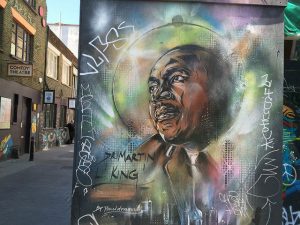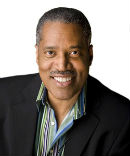 In 1964, Dr. Martin Luther King Jr. appeared on a BBC news show. The host asked King about Attorney General Robert Kennedy’s prediction, an audacious one at the time, that a black man could be elected president in 40 years.
In 1964, Dr. Martin Luther King Jr. appeared on a BBC news show. The host asked King about Attorney General Robert Kennedy’s prediction, an audacious one at the time, that a black man could be elected president in 40 years.
King thought it would not take that long: “There are certain problems and prejudices and mores in our society which make it difficult now. However, I am very optimistic about the future. Frankly, I have seen certain changes in the United States over the last two years that surprise me. … On the basis of this, I think we may be able to get a Negro president in less than 40 years. I would think that this could come in 25 years or less.”
It took 44 years.
The day after the election of President Barack Obama front-page stories in newspapers all over the country, including The New York Times, quoted black parents saying things like, “For the first time in my life I can truly look my child in the eye and say, yes, you could become president someday.”
A tearful Jesse Jackson said he never thought he would see the day. Rep. John Lewis, D-Ga., a civil rights leader who marched with Dr. King, said: “I feel very grateful that I’m still here to be here during this unbelievable historic moment in our country. This is a day of thanksgiving, a night of celebration. … It’s unbelievable that we have come such a distance in such a short time, to see a young African-American man elected president of the United States.”
It’s difficult to overstate the significance of the election of President Barack Obama.
As recently as the 1950s, polls showed that the majority of Americans said they would never vote for a black person for president, no matter how qualified. But in 2007, then-Sen. Obama, speaking at a historically black church in Alabama on the 42nd anniversary of the Selma march, talked about our country’s great progress in race relations. America, according to Obama, is “90 percent of the way there.” Obama said: “I’m here because somebody marched for our freedom. I’m here because y’all sacrificed for me. I stand on the shoulders of giants. I thank the Moses generation. But we have got to remember now that Joshua still had a job to do. … The previous generation, the Moses generation, pointed the way. They took us 90 percent of the way there. But we (the ‘Joshua generation’) still got that 10 percent in order to cross over to the other side.”
Now this “90 percent” occurred before Obama’s election and re-election, so presumably, we carved into the remaining 10 percent. But, oh what a difference a few years makes. Two things occurred.
First, the election of a black person did not bring about the expected “hope and change.” In fact, the percentage of blacks living in poverty increased under Obama. Shortly before Obama’s election, a supporter at a campaign rally named Peggy Joseph famously gushed about what an Obama victory would mean: “I wouldn’t have to worry about putting gas in my car. I wouldn’t have to worry about paying my mortgage. You know — if I help him, he’ll help me.” Well, guess what. Barbara Bush was right when she said, “Your success as a family, our success as a society, depends not on what happens at the White House but on what happens inside your house.”
In 1992, the Department of Justice’s Bureau of Justice Statistics examined the 75 most populous counties. Turns out the jury is less likely to convict a black defendant of a felony than a white defendant. The study found that “in 12 of the 14 types of crimes (felonies including murder, rape and other serious crimes) for which data was collected, the conviction rate for blacks is lower than that of whites.” Similarly, in 2013, the National Institute of Justice, the research and evaluation agency of the DOJ, published their study of whether the police, as a result of racial bias, stop blacks more than other drivers. The conclusion? Any racial disparity in traffic stops is due to “differences in offending” in addition to “differences in exposure to the police” and “differences in driving patterns.”
My uncle Eddie, a barber in Chattanooga, Tennessee, immersed himself in local Republican politics. He died 20 years before Obama got elected. He would’ve been stunned that the country of segregation in which he was born could evolve so that his nephew would see the election of a black president. But he would likely have been even more astonished at how quickly Martin Luther King’s dream of a colorblind society has turned into a quest to purge the town square of Confederate statues. He would have been shocked that a group called Black Lives Matter, given credibility by the Obama administration, issued a “list of demands” of white people.
In eight years, we’ve gone from the election of the first black president to a call for campus “safe spaces” to combat alleged racist “microaggressions.” Uncle Eddie would have called this moving the goal post.
COPYRIGHT 2017 LAURENCE A. ELDER
DISTRIBUTED BY CREATORS.COM
Photo credit: Matt Brown (Creative Commons) – Some rights reserved
 Larry Elder is a bestselling author and radio talk-show host. To find out more about Larry Elder, or become an “Elderado,” visit www.LarryElder.com. Follow Larry on Twitter @larryelder.
Larry Elder is a bestselling author and radio talk-show host. To find out more about Larry Elder, or become an “Elderado,” visit www.LarryElder.com. Follow Larry on Twitter @larryelder.
The views expressed in opinion articles are solely those of the author and are not necessarily either shared or endorsed by Black Community News.
 CURE News and Clergy Blog News and Commentary for Christians
CURE News and Clergy Blog News and Commentary for Christians



